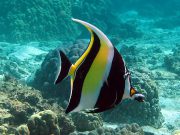Tauchen mit Maurische Idole
Meeresleben von Lanta | Zanclidae
Der Moorish Idol ist die einzige Art in der Familie Zaclinade und ist eng mit den Falterfischen verwandt. Wir sehen diesen Fisch an fast jedem Tauchplatz, wenn wir um Koh Lanta tauchen.
Er kommt in fast allen Korallenriffen und manchmal auch auf sandigem Grund vor und ist einer der am weitesten verbreiteten Fische im Indopazifik. Der Moorish Idol ist an allen Tauchplätzen rund um Koh Lanta zu finden.
Der Gattungsname Zanclus leitet sich vom griechischen Wort für 'Sichel' ab und bezieht sich auf die lange, sichelförmige Rückenflosse. Der lateinische Artname „cornutus” bedeutet „Horn” und bezieht sich auf die knöchernen Auswüchse über den Augen der adulten Tiere.
1 Arten auf dieser Seite gefunden:
Moorish Idol
(Zanclus cornutus)
Moorish Idols are difficult to miss at any of the dive and snorkel sites around Koh Lanta; they are one of the most widespread species in the Indo-Pacific region, and one of the most colourful and recognisable.
The Moorish Idol is originally thought to have been named by the Moors of Africa, who believed the fish to be a bringer of happiness and was first scientifically described in the 1750s.

Zanclus cornutus @ Koh Haa
With a highly compressed disc or oval-shaped body, Moorish Idols have contrasting vertical bands of black, white and yellow. A small mouth is located at the end of a long, tubular snout, with an orange saddle across the snout. Adults have small bony projections, 'horns', above their high-set eyes and these are larger in males.
Moorish Idols have relatively small fins, except for their long sickle-like crest which trails from the dorsal fin. The dorsal fin comprises 7 spines, of which the third extends to form a long, sickle-like filament, which shortens with age.
Longer, trailing dorsal fins indicate younger fish. The long dorsal fin is likely to deter predators, which include Moray Eels.
Adults commonly reach 15 - 16 cm in length and are thought to have a lifespan of 4+ years.
Similarly to Butterflyfish, Moorish Idols mate for life and can be seen singularly, in small groups or 2 - 3, sometimes in small schools of 10 - 20, and occasionally in larger schools of 100 - 200+ around some of our dive sites.
The genus name Zanclus is derived from the Greek word for 'sickle', referring to the long sickle-like dorsal fin, and the Latin species name 'cornutus' means 'horn' which refers to the bony projections above the eyes in adults. The Moorish Idol is the only species in the family Zaclinade.
Moorish Idols can sometimes be confused with the Schooling Bannerfish or Longfin Bannerfish, which are members of the Butterflyfish family, however, the Moorish Idol is actually closer to the Surgeonfish family than the Butterflyfish family.
The Moorish Idol can also be easily distinguished from Butterflyfish by their prominent black, triangular anal fin.
Sponges and coral polyps dominate the Moorish Idols' diet, supplemented to a lesser extent with small molluscs, bryozoans, and tunicates (aquatic invertebrate animals), small crustaceans and hydroids.
At night Moorish Idols change color, taking on a rather drab and much less colourful appearance and will stay near the bottom of a reef.
Reproduction of Moorish Idols is not well understood, however, they are known to release eggs and sperm into the water column (pelagic spawners), leaving the fertilised eggs to drift with the currents. The longer pelagic larval and post-larval stages result in a length of up to 8cm before transitioning to free-swimming juveniles. This extended larval stage may explain the wide distribution of this species.
Tauchen mit Maurische Idole rund um Koh Lanta
Tauch- und Schnorchelausflüge
Wenn Sie gerne die Gelegenheit hätten, Maurische Idole auf einem unserer täglichen Tauchausflüge während der Hochsaison von Koh Lanta aus zu sehen, dann senden Sie uns eine E-Mail an info@diveandrelax.com.
Nehmen Sie an unseren Speedboot-Tauchausflügen in der Hochsaison zu einigen der besten Tauchplätze Thailands teil und genießen Sie kleine Gruppen, kurze Fahrzeiten und einen Fokus auf hervorragenden persönlichen Service, Sicherheit und Spaß.
Noch kein zertifizierter Taucher? Lernen Sie auf Koh Lanta das Tauchen mit dem 3-tägigen SSI Open Water Diver Kurs.
Buchen Sie online und sparen Sie 10% auf Tauchausflüge und Tauchkurse auf Koh Lanta.
Weitere Informationen
Indo-Pazifische Meereslebewesen-Führer
- Allen, G., Steene, R., Humann, P., DeLoach, N. (2003) Reef Fish Identification, Tropical Pacific. Jacksonville, FL., USA: New World Publications, Inc., ISBN 1-878348-36-1.
- Humann, P., DeLoach, N., (2010) Reef Creature Identification, Tropical Pacific. Jacksonville, FL., USA: New World Publications Inc., ISBN 978-1-878348-44-9
- Debelius, H. (2013) Indian Ocean Reef Guide. Frankfurt, Germany: IKAN - Unterwasserarchiv, ISBN 978-3-939767-52-7.
- Debelius, H. (2004) Nudibranchs and Sea Snails, Indo-Pacific Field Guide. Frankfurt, Germany: IKAN - Unterwasserarchiv, ISBN 3-925919-51-1
- Erhardt, H., Knop, D. (2015) Corals Indo-Pacific Field Guide. Frankfurt, Germany: IKAN - Unterwasserarchiv, ISBN 3-925919-69-4.
- Veron J.E.N., Stafford-Smith M.G., Turak E. and DeVantier L.M. (2016). Corals of the World
Weitere Referenzen zu Meereslebewesen und weitere Informationen


